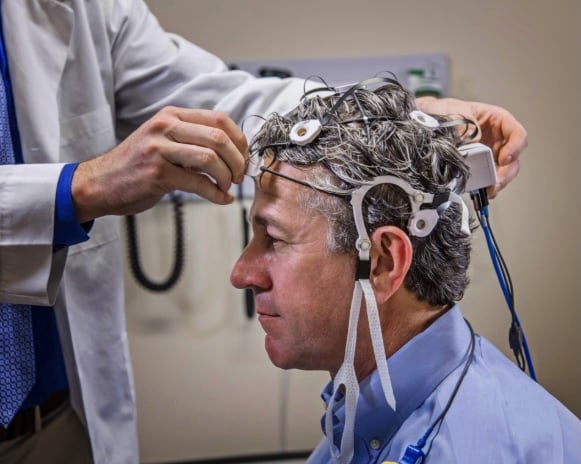The challenge of monitoring cognition
Cognitive complaints often emerge gradually, with patients or families describing memory lapses, reduced concentration, or slower thinking. Distinguishing normal age-related change from evolving impairment is difficult at a single visit. Screening instruments are useful but can be influenced by mood, education, or patient effort. Longitudinal monitoring is essential, yet many primary care practices lack objective tools to track change over time.
Why ERP/EEG adds value
The COGNISION® System provides in-office ERP and EEG testing that captures how the brain processes auditory stimuli and records ongoing electrical activity. These physiologic signals offer a reproducible measure of brain function that is less dependent on patient self-report or engagement level. For clinicians, this means cognitive change can be tracked with quantifiable physiology rather than relying solely on subjective observations.
Practical workflow for repeat assessments
Setup with the COGNISION® System takes only five to ten minutes, and the test is completed in about an hour in any standard exam room. Reports are generated immediately, so results can be reviewed and documented during the same encounter. Because the headset is comfortable and technician training is straightforward, repeating the test at intervals is feasible without disrupting patient flow. This enables trending results across months or years.
Differentiating trajectories
Serial ERP and EEG reports provide clarity on whether symptoms are stable, improving, or worsening. A patient with subjective complaints but stable physiologic results may be reassured and monitored. A patient with measurable decline over time can be referred for advanced evaluation, while documentation demonstrates the objective basis for escalation. Tracking over time also supports earlier recognition of dementia or other progressive conditions, where early intervention may alter care planning.
Integrating results with the clinical picture
The COGNISION® System is not a stand-alone diagnostic. Results must be interpreted alongside history, exam, laboratory data, and consideration of mood, sleep, and medications. In practice, the test provides a physiologic anchor that complements these domains. Documentation of serial reports strengthens the clinical record and provides a foundation for conversations with patients, families, and specialists.
Validation and credibility
Your materials emphasize that the COGNISION® System has been validated in more than 30,000 tests, is FDA-cleared, and is listed on the Alzheimer’s Association website. ERP testing is also recommended by the American College of Occupational and Environmental Medicine for concussion evaluation, underscoring its clinical credibility. These reference points support adoption as a trustworthy tool in cognitive monitoring.
Reimbursement and accessibility
Testing with the COGNISION® System is Medicare reimbursable, with multiple CPT codes available for coverage. Practices report an average reimbursement per session that helps sustain cognitive programs. Flexible financing options, including deferred payment periods, make it easier for clinics to adopt the system and establish workflows for repeat testing.
By making ERP/EEG testing accessible in primary care, the COGNISION® System enables clinicians to track cognitive change over time with objective, reproducible data. This supports clearer decision making, stronger documentation, and earlier recognition of progressive impairment, while fitting seamlessly into routine practice.






